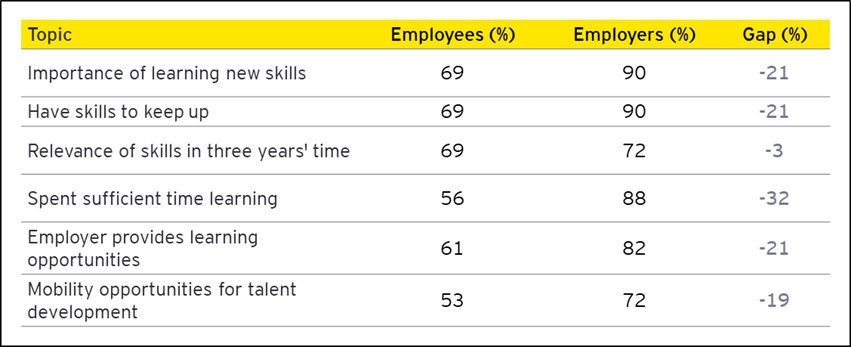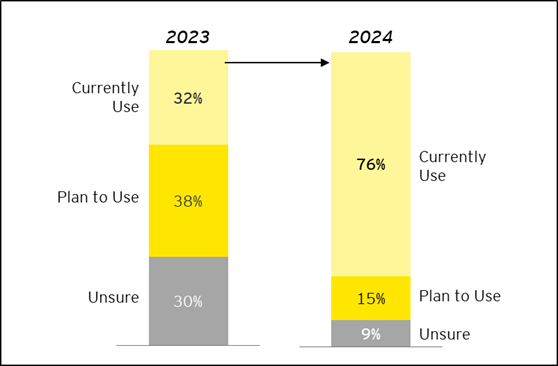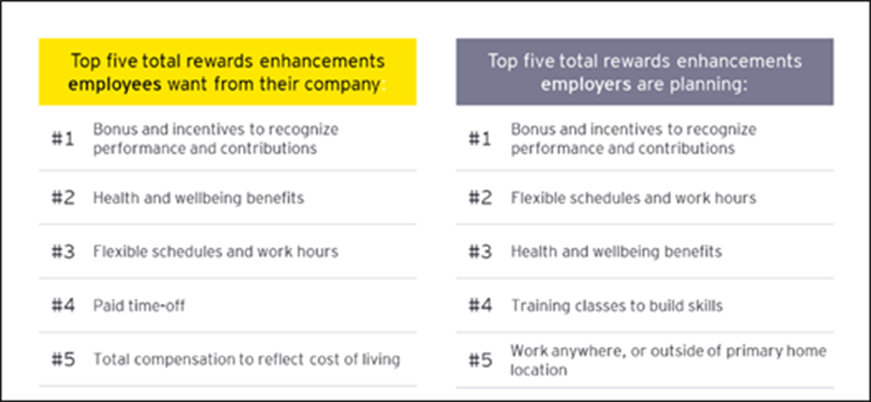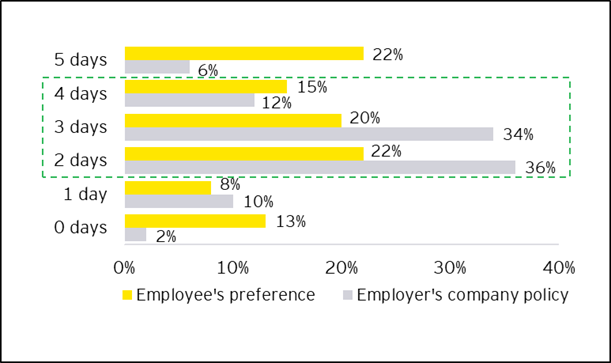EY refers to the global organization, and may refer to one or more, of the member firms of Ernst & Young Global Limited, each of which is a separate legal entity. Ernst & Young Global Limited, a UK company limited by guarantee, does not provide services to clients.
Malaysian employers and employees cite skills development as top priority for better career opportunities
- Skills development is top priority for employers and employees
- Adoption of GenAI in the workplace has increased from 32% to 76%
- There is a mismatch in cultural perception between employers and employees
- About half of employees (58%) agree total compensation from employers is fair and equitable
- 38% of employees in Malaysia desire to quit, up from 32% in 2023
In line with global trends, a significant majority of both Malaysian employers (69%) and employees (90%) believe that acquiring new skills is an important factor in creating better opportunities and growth in the workplace.
These findings come from the EY 2024 Work Reimagined Survey, which polled 17,350 employees and 1,595 employers across 23 countries and 27 industry sectors worldwide. The survey included 1,050 employees and 200 employers from Southeast Asia, covering Singapore, Indonesia and the Philippines, as well as 250 employees and 50 employers in Malaysia.
While both parties acknowledge the importance of skills development, they diverge significantly on whether employees are receiving adequate opportunities and support. This misalignment in the practical “how” of learning and development stems from differing perceptions on available resources, time allocation for learning, or even career mobility prospects.
The study highlights that bridging this gap is essential to ensure that learning translates into tangible growth for employees and, ultimately, benefits the overall structure of an organization.

Figure 1: Level of agreement with organization’s L&D initiatives of Malaysian employees and employers
Anil Shivadas, Partner, Ernst & Young Consulting Sdn. Bhd. said: “The younger generation continues to fluidly move between employers in search of new experiences, future skills and flexible working practices. Legacy talent strategies have become ineffective. Forward-looking talent strategies should shift the focus from the duration of an employee’s tenure to his or her values, the quality experience, and contributions to the organization. To make progress, organizations must pay greater attention to human connection, culture and learning and development investments to create a win-win workplace environment. These factors are imperative to confidently shaping the future.”
Positive outlook in GenAI adoption
The adoption of GenAI in the workplace in Malaysia has surged from 32% in 2023 to 76% in 2024, indicating that many employees who planned to use GenAI have now become active users. This trend mirrors the global increase of 44 percentage points over the same period.

Figure 2: Malaysian employees’ usage of GenAI at work
Nevertheless, most employees (88%) believe that Malaysian companies need to take significant or moderate steps to adopt the necessary technological tools to fully integrate GenAI into their workplaces.
Employees eye exit amid economic growth
The study also revealed that 38% of employees have expressed an intention to quit their jobs. Among them, 88% have cited career advancement (compared to 79% globally) and increased total remuneration (compared to 81% globally) as their primary reasons to resign.
Over half of the Malaysian employees (62%) highlighted that enhancing bonuses and incentives to recognize their performance and contributions is vital for increasing their job satisfaction. Additionally, 55% stated that having flexibility in work schedules and the ability to work from anywhere would improve their satisfaction.
While salary remains an important factor, only 58% of employees believe that the total compensation they receive is fair, equitable and transparent. Conversely, 82% of employers feel that compensation is adequate, revealing a 24% gap in reward satisfaction between the two groups – a figure that is 5% higher globally.
Low Choy Huat, Malaysia People Consulting Leader, Ernst & Young Consulting Sdn. Bhd. said: “The rise of remote and hybrid work has reshaped our approach to workforce productivity, shifting the focus away from the traditional emphasis on hours spent on-site. Additionally, the survey results reveal a mismatch between the top reward enhancements desired by employees and those prioritized by employers in Malaysia. Employees place paid time-off and reflective total compensation among the top five factors for reward enhancements while employers rank training and work flexibility in their top five.”

Figure 3: Top five total rewards enhancements priorities of Malaysian employees and employers
Employees and employers at odds over cultural perception
While a significant majority of companies (92%) believe that organizational culture is improving, only 65% of employees agree – a decline from 66% in 2023 and 76% in 2022. Employees have pointed out several cultural challenges, such as feeling uninspired at work (12%), dealing with an unbalanced workload (13%) and perceiving that their leaders do not care about them (13%).
However, both groups acknowledge that New Ways of Working (NWoW) are essential for driving productivity. Most responses from both employers and employees support working offsite for two to four days a week.

Figure 4: Malaysian employees preferred remote workdays vs company policies allowed
- ends -
Notes to editors:
About EY
EY is building a better working world by creating new value for clients, people, society and the planet, while building trust in capital markets.
Enabled by data, AI and advanced technology, EY teams help clients shape the future with confidence and develop answers for the most pressing issues of today and tomorrow.
EY teams work across a full spectrum of services in assurance, consulting, tax, strategy and transactions. Fueled by sector insights, a globally connected, multi-disciplinary network and diverse ecosystem partners, EY teams can provide services in more than 150 countries and territories.
All in to shape the future with confidence.
EY refers to the global organization, and may refer to one or more, of the member firms of Ernst & Young Global Limited, each of which is a separate legal entity. Ernst & Young Global Limited, a UK company limited by guarantee, does not provide services to clients. Information about how EY collects and uses personal data and a description of the rights individuals have under data protection legislation are available via ey.com/privacy. EY member firms do not practice law where prohibited by local laws. For more information about our organization, please visit ey.com.
This news release has been issued by Ernst & Young Consulting Sdn Bhd, a member of the global EY organization.
About the EY 2024 Work Reimagined Survey
In August 2024, the global EY organization conducted the fifth installment of the Work Reimagined Survey to better understand the continued changes in global talent dynamics, working patterns, and the balance of power between employers and employees.
The research included a survey of 17,350 employees a survey of 1,595 employers from organizations with 500 or more global employees. Respondents represented 27 sectors and 23 countries covering the Americas, Asia-Pacific, and EMEIA (Europe, the Middle East, India and Africa).


